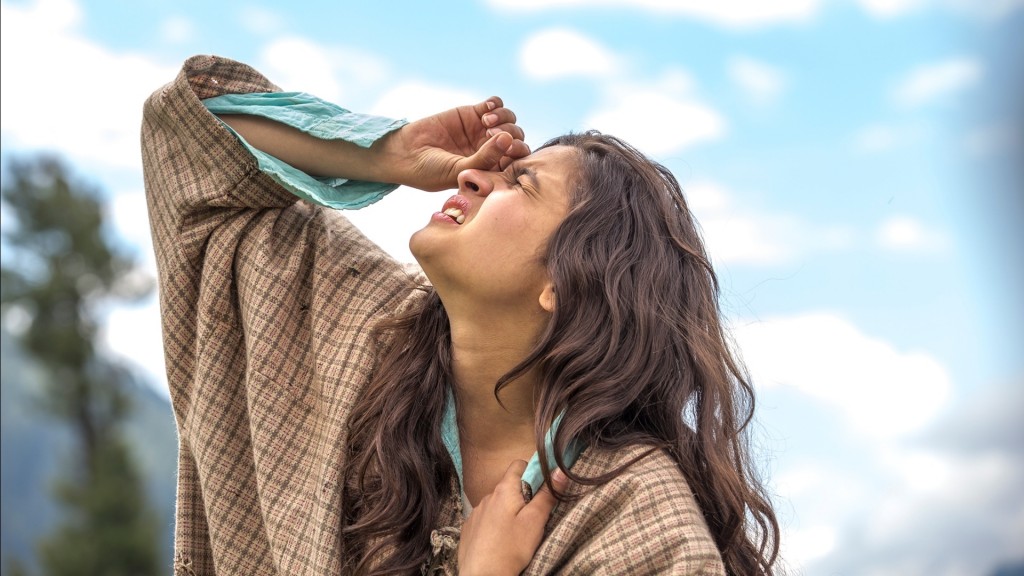Much like the pristine landscapes of Rajasthan and Punjab and the stunning vistas of Himachal through which it travels, Highway is a film that lacks any ‘tamasha’. It follows both protagonists intimately through their journey, and gives time and space for the characters to grow, naturally and unhurriedly. One is trying to reach a destination, the other running away from one. By the end of it, their roles could easily be reversed.
Randeep’s Mahavir starts this journey on his own will, but has no control of where he ends up reaching. He happily lets Alia take over the path, becoming the follower to her Veera. Veera, who was kidnapped and forced to travel with him, becomes the one to influence where they go. This is the essence of Highway – Mahavir and Veera, two people with nothing in common evolving to resemble more of the other, and finding out that’s who they really are. It’s a trip that dissolves the people they were, built largely by others. They’re reborn and remade, a reminder what they are truly meant to be.
There’s no doubt that it’s the kind of film that will split opinions. Imtiaz does not intend to make this a three-act story, and for the large parts in the middle where it does not try to fit a classic plot template, Highway is at its best. Scenes unfold at their own will, and with no pattern to dictate what should happen next. In contrast, the ending and the need to re-emphasize a “plot resolution” appear heavy-handed, even unnecessary. It’s possible that his treatment of Alia’s unfortunate past does not work for an audience – it did not work for me. But it’s one of those instances where you’re hard pressed to find a good enough reason for why it did not work, and almost comes down to an opinion rather than an objective reason. So too for his decision on showing how Alia rationalizes her own response to being kidnapped. It sticks out because it’s inconsistent in tone to anything else in the film. So you question why it’s there or how it’s done. At the same time, there’s also a voice in your head that goes: but so what?
Anil Mehta’s cinematography has some unconventional choices. For large portions of the film, the camera work is invisible. There is no overemphasis on “beautifying” the landscape just because it’s a road movie. He doesn’t want you to admire the world as an outsider, and the scenery is just another part of the misc en scene. He pauses on its beauty when the characters do, not otherwise. This is consistent with the narrative’s lack of melodrama. In sharp contrast, there are scenes where it comes to the forefront. Like the sequence where Alia wants to run away, and finds herself alone on the desert. You’re yanked out of the story to see Veera’s metamorphosis, much like how Veera herself seems to snap out of her stupor, becoming starkly aware of the transformation in her. The other instance is when two apparently unrelated sequences are shot identically. The film opens with a handycam recording Veera’s wedding preparation, with all the buzz of a rich Delhi bride getting married. Much later, this style is once again used to show how the police and government machinery is mobilized to search for Veera. Both seem to mock what is unfolding on screen, because they are a farce. In both instances, it looks like people are trying to decide what is good for Veera, and on both occasions they are wrong.
Because it is sparingly used, AR Rahman’s music makes it’s presence felt even more. Patakha Guddi makes you want to take a road trip there and then, and is easily the song of the album. Sound and music are both understated in the film, and work wonders in being so.
Randeep Hooda deserves credit for making Mahavir very likeable. He spews venom but you always feel there’s a cross he’s carrying, and sympathy comes easily for him. The rugged sterotype works very well for him in this story. Alia Bhatt gives it her all for the central role of Veera. Again, her natural spunkiness comes through and carries her through most of the film. It’s a huge ask for an inexperienced actress to take this role up, and there’s no doubt Bollywood will seem a much easier place to her from here on.
It’s bold of a commercially successful director like Imtiaz to take this idea and faithfully narrate it on screen. He does not seek mainstream Bollywood devices to try and market his film, because it would compromise his story. His idea may or may not work, but you have to applaud the risk he’s taken and the fact that for major portions, he does indeed pull it off.
Hindi, Romance, Drama, Color


